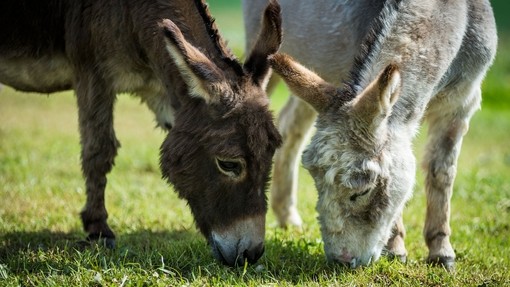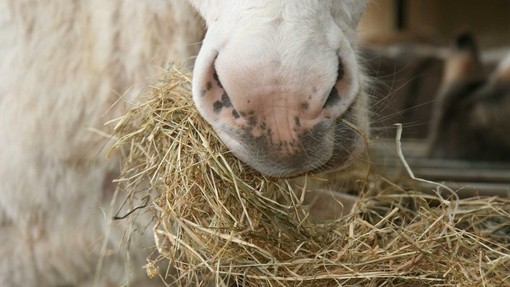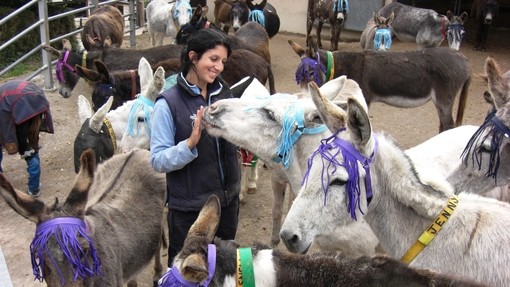Vigilance
As they age the donkey’s behaviour changes, so it is important to be familiar with their normal behaviour patterns in order to spot any changes that may indicate a problem, so your vet can be called to give appropriate treatment as soon as possible.
As donkeys age it is important to monitor their eye sight, discolouration, or changes to the eye or changes in behaviour, can be early signs of failing sight. If you suspect your donkey is losing their sight talk to your vet.
Generally donkeys cope well with blindness so if your donkey starts to lose their sight, a familiar environment to live in and a consistent routine that they can predict can help them adjust to becoming blind. The use of padding on their head collar, to prevent bumps and knocks as eyesight fades will further help a donkey cope with blindness.
It is important that your older donkey maintains a good quality of life and any concerns over this should be discussed with your vet. The Donkey Sanctuary has developed an assessment tool called monitoring your donkey’s quality of life. This can be used by owners or donkey carers to record changes in a range of quality of life markers.
To prevent suffering it is important to prepare for the tough decision that may have to be made to put an older donkey to sleep. The Donkey Sanctuary also has a factsheet on dealing with euthanasia and death which may be helpful around this difficult time.
Be on the lookout for small changes in normal behaviour patterns, which can be the first sign of problems.
The environment
It is important to anticipate the needs of the ageing donkey before they arise. Providing suitable shelter for your older donkey allows them to get out of the rain or the heat as well as avoiding flies. Leave doors open to give them choices of where they feel most comfortable.
Access to a sunny spot will allow your donkey to sunbathe and warm any stiff joints or aching muscles if they wish. If possible provide a heat lamp in the colder months and allow your donkeys to choose if they need to use it.
A flat or gently sloping field is best for older donkeys as it will help keep them mobile. Access to hardstanding is good for all donkeys’ feet. To minimise the risk of slipping over ensure you have some road salt in stock for colder winter months to prevent ice forming on the yard.
Arthritis of the neck and spine, as well as arthritis of the limb joints, is not uncommon. Donkeys affected with arthritis may find eating and drinking easier if water and feed are offered at the most appropriate height. Raising or lowering feed and water buckets as required may make them more comfortable.
You may need to consider different bedding for an older donkey. If they have teeth problems, barley straw may increase the risk of colic, as they may not be able to chew the long fibre sufficiently.
Your older donkey may have more problems getting up and down and may struggle to walk on a straw bed, so consider using a different type of bedding such as shredded wood fibre, or dust extracted wood shavings. Rubber matting under one of these dust free beddings may provide a more comfortable, warm bed for your older donkey to rest on.
Water
Ensuring good water intake is one of the most important elements of keeping your older donkey healthy.
Sufficient water intake is vital to health and digestion especially for the older less active donkey.
To ensure good water intake, provide several sources of clean fresh water at the appropriate height, this might be in buckets, water troughs, or automatic drinkers.
In cooler weather older donkeys often reduce their intake of cold water, so offer your older donkey warmed water. This can be from a warm tap or add some warm water from a kettle to a bucket of water. It may take time for your donkey to realise warm water is available so persevere for a week or two and monitor your donkeys preferences.
Care
Extra grooming and keeping feet low when being picked out will help keep your donkey comfortable. As donkeys age they may moult less effectively and due to conditions such as arthritis may be less able to roll or self groom, so an older donkey will benefit from more regular grooming and general care.
Bear in mind your older donkey with a thick coat may overheat during spring and summer and may need to have the hair removed from under their bellies to help regulate their temperature. If you think your donkey is overheating discuss the problem with your vet.
Eyes and nose may need daily cleaning with damp cotton swabs, using a separate one for each eye and nostril to avoid the spread of disease. Feet should be picked out every day, if they have stiffer joints, it is essential to keep the older donkey’s feet low to the ground and underneath the animal (ie not lift out to the side) to avoid discomfort.
Flies can be a real problem for older donkeys as they lose skin sensitivity and are less active at removing flies, so extra care may be needed to limit the damage done by fly bites. Application of fly spray 2 or 3 times a day may help.
There are fly rugs that prevent flies from biting and nearly all older donkeys benefit from wearing a fly mask or fly fringe to protect their eyes and face from flies. In some cases leg protection in the form of leg guards/fly socks, fly cream or mesh fly guards may be required.
Try to minimise the number of flies in the area by siting the muck heap well away from the donkeys. Using fly catchers or sticky tape to reduce the number of flies may help further and in extreme cases consider shutting your donkeys in at dawn and dusk.
Birds such as crows and magpies can also cause problems by pecking the backs of older donkeys if this happens treat the wound according to directions given by your vet and consider using a fly rug on your donkey to prevent further damage.
Rugs
Be prepared; ensure your rug is clean and well maintained before the cold weather sets in. As donkeys age, they may benefit from a well-fitting donkey rug. This will allow them to maintain their body temperature while giving them the freedom to roam outside regardless of the weather. It may take some time to locate the right rug for your donkey so plan well ahead and be prepared for sudden changes in weather or the donkey’s condition.
Further ageing, development of dental problems or loss in weight may mean they require a thicker padded rug to maintain their temperature and bodily condition. See the Donkey Care Handbook for more details on measuring and fitting rugs. Check rugs daily to prevent rubbing and take off for short periods on dry, warm winter days.
Companionship
If an older donkey has a younger companion ensure that the needs of both are met and recognise that your older donkey may need some timeout from a boisterous younger friend. Younger donkeys may need to be separated at feed times to ensure that older donkeys are able to eat any additional feeds that are required.
Feet and teeth
Older donkeys may need more regular professional care to maintain a good quality of life. Older donkeys may need more visits from a farrier, equine vet or equine dental technician to help them stay comfortable as their teeth and feet continue to wear.
Feeding the older donkey can require specialist advice, as there are a number of factors which must be taken into account, including certain medical conditions. Donkeys with liver or kidney disease may require specialist feeding which should be discussed with your vet.
Donkeys with poor teeth will also require adaptations to the diet, as outlined in feeding donkeys with dental problems factsheet.
One of the most common issues with feeding the elderly donkey is helping them maintain condition and preventing unnecessary weight loss.
To help you find the right diet for your donkey read our factsheet: Feeding elderly donkeys
Mental stimulation
Use it or lose it, even older donkeys like to think, so provide for their mental wellbeing. It is important to provide mental stimulation for all donkeys including older donkeys. Provide an environment that allows the older donkey to make choices about the source of water, food, and shelter.
Whereas younger donkeys may well play with toys, older donkeys will benefit most from the mental stimulation provided by extra human contact in the form of grooming, massage, and going for short walks if they are physically able.
If possible, an older donkey may enjoy being led to a hedge, so they can browse on different plants. This can be particularly useful to remember as if your donkey loses their appetite for any reason leading them to the hedgerow can often encourage them to eat.




